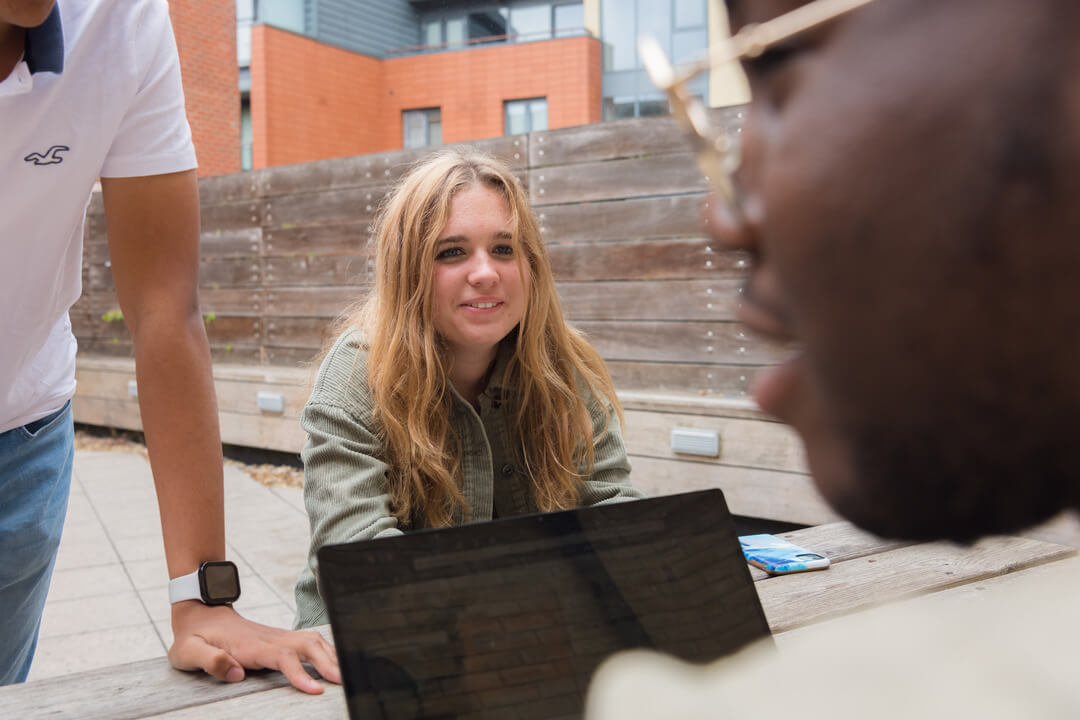Many universities have an interview process in place to help them make offers to prospective students. Interviews are especially common at certain universities like the University of Oxford, the University of Cambridge and Durham University, as well as for certain subjects, including Law and Medicine.
Attending an interview is a great way for applicants to experience a university firsthand, and to engage in exciting academic discussions with admissions tutors. However, lots of students can find the interview process nerve-wracking, and so it’s helpful to thoroughly prepare so you can feel confident and well-equipped on interview day.
To help you prepare, we’ve compiled a list of the 20 most common university interview questions you might be asked. Knowing what to expect – and preparing accordingly – is an important part of the interview process.
This article has been written by Jamie, a recent Law graduate of the University of Oxford, who has shared his top tips for a successful interview. So read on to find out how to ace your interviews, and secure your university spot!
Preparing for University Interviews
The best starting point when preparing for university interviews is to do your research! Consider what’s important to you when choosing a university, and be sure to take your time to decide which universities you’d like to apply for.
Once you have chosen your universities, check out their websites to get a better idea of the course structure and what to expect during your degree. It’s an excellent idea to find out which optional modules are available in your subject, as these will vary from university to university. If you’re particularly interested in any of these, they’ll make a great topic of conversation with your interviewer while also showing your genuine interest in the specific course at that university.
Once you have researched your chosen course, it’s a great idea to begin practising with mock interviews. There are a number of external agencies who host mock interviews, and often schools and sixth-forms will help facilitate this for you – so definitely ask your teachers!
If you can’t get an external mock interview, many teachers will be happy to interview you themselves, to give you an idea of the structure and feel. Mock interviews are arguably the most helpful way to prepare for a university interview, so do as many as you can.
Understanding the Interview Process
The style of your interview should be explained to you before you arrive, either on the department’s website or in the email you receive inviting you to interview. If you’re worried about what to expect, you can always email the admissions team to ask, and they’ll be more than willing to answer your questions – that’s what they’re there for!
Interviews can vary between universities and courses. Some courses, such as Law, tend to take a more traditional approach. I had two interviews for my Law application, each with two tutors. One focused on my interpretive skills, testing my understanding of a legal statute, whilst the other tested my comprehensive abilities, asking for my thoughts on a legal article.
Other universities may have a larger panel of tutors at interview, or use a Multiple Mini Interview style to test your knowledge with a round of quick-fire questions. Again, you should know what to expect before you attend, so you’re able to prepare effectively.
There are a few tips which are universally helpful regardless of the interview style:
- Take your time to answer a question! This shows the interviewer that you’re thinking carefully about your answer – it’s perfectly normal to think about what you want to say before responding.
- When you have an answer, try your best to speak slowly and clearly. You want to evidence your ability to communicate effectively and coherently.
- If you make a mistake or need to backtrack, don’t panic! Interviewers understand that you’re nervous, and won’t mind if you change your answer – in fact, they’ll appreciate that you’ve been able to adapt and maturely admit if you’ve made a mistake.
All of these tips will help you to stand out in an interview, and showcase all of your wonderful skills and knowledge.

Answering the Top 20 Common University Interview Questions
1. “Tell us about yourself.”
This question can sometimes seem the scariest, as working out where to start can be incredibly daunting! However, this question is to help your interviewer understand your personal academic journey.
Consider your answers to the following questions:
- What has motivated you to study this particular course at this particular university?
- What are your relevant academic achievements or work experience?
- What are your longer term goals, and how does the course fit into those goals?
You can prepare for this by talking your answers through with a friend, relative or teacher. Time yourself, and aim to talk for between 45 seconds and one minute to make sure you’re both informative and concise.
2. “Why did you choose this course and university?”
This is a great opportunity to show off your research. Your answer will depend on the university and course you’ve chosen, but you should aim to give a balanced answer to both parts of the question. Make sure you can talk about something specific for both your chosen course and university. This could be the structure of the course, the optional modules, the faculty specialisms or the style of teaching.
All of these will help show your interviewers your genuine motivations for applying.
3. “What relevant skills or experiences do you possess?”
Here you have the chance to build on your answers to previous questions, and discuss your academics or work experience in more depth.
Choose one or two transferable skills which apply to your chosen course – such as public speaking, writing or research – and discuss how these are applicable. Reflect on specific experiences that have helped you to develop these skills.
If you want to get some extra relevant experience, check out the Oxford Scholastica Academy summer courses to explore your subject beyond the school curriculum in an international environment!
4. “How do you envision making a positive impact in your chosen field of study?”
To spark some inspiration for this question, think about contacting some university graduates to find out what they’ve done to positively impact their chosen field of study.
Try to tailor your answer towards research, innovation, community engagement or social impact initiatives, to provide a clear focus to your answer.
One way to focus your thinking on this is to enter the Oxford Scholastica Essay Competition – this year’s question centres around optimism in your chosen field of study.

5. “How do you handle challenges or setbacks?”
Try to identify a challenge or setback that you’ve faced in your academic career. You can use the example to break your answer down into different components.
- Start with a brief overview of the challenge or setback.
- Discuss your approach to overcoming the challenge.
- Reflect on what went well, and how you would approach a similar challenge in the future. It’s okay if you’d change the way you handled the challenge – you don’t have to have got it perfect the first time for it to be a valuable experience!
Questions like these are a great opportunity for interviewers to get to know you beyond your academics, and for you to showcase key skills like problem solving, resilience and adaptability.
6. “Describe a time when you worked effectively as part of a team.”
Think back to any academic group projects or extracurricular activities you’ve been involved in, like sports teams or science clubs.
It’s especially helpful to discuss teamwork exercises where you might have taken on a leadership role, as this gives you a chance to show that you can lead others to success while maintaining a collaborative environment.
7. “What are your career aspirations, and how does this course align with them?”
Spend some time before the interview thinking about your motivations for studying, and identifying your long term goals. You don’t need to have prepared a 20-year plan, but it’s a good idea to have considered the type of career you may want to pursue after university, as well as the skills and experiences you hope to gain from your degree to facilitate this.
8. “Tell us about a book or academic article that has influenced you.”
Academic reading is a great way to prepare for your university applications, and you should start to weave this into your daily routine as soon as possible. The broader your knowledge, the more informed you’ll be to make a decision about what you want to study at university.
The interview is a great environment to engage with your wider reading – take some time to reflect on what you’ve enjoyed reading about the most, and which topics have captured your interest. It’s also helpful to identify any topics you haven’t enjoyed, or any literature you’ve disagreed with.
Be prepared to have a discussion about the book or article – especially if it’s a well-known source! – as your interviewers will likely want to know more about your thoughts and reflections.
9. “Discuss a current issue or topic in your chosen field of study.”
This question is a common one. Interviewers are looking to see if you’re self-motivated to keep up with current affairs, and if you can think critically about current issues related to your chosen field of study.
Think about reading reputable news sources, such as The Financial Times, The Telegraph and The Economist, to learn more about contemporary issues. You can also sign up below to our weekly newsletter for subject-specific resources!
10. “How do you manage your time and prioritise your tasks?”
Think about one or two instances where you’ve been under time pressure – this could be at a Saturday job or during exam season in school. From here you can think about the ways in which you were able to manage a number of different commitments. Did you invest in a planner, or create a personal timetable? Did you create to-do lists, or colour-code your tasks?
Your interviewers want to see evidence that you’re able to effectively prioritise tasks, as you’ll have to manage your own workload at university.
11. “What can you contribute to our university community?”
It’s absolutely fine to discuss some of your personal interests and hobbies if you’re asked this question in an interview. After all, the interviews aren’t solely about your academic interests – your interviewers will also want to learn about your personality and interests.
If you have a hobby or sport that you love, talk about your plan to join relevant societies and to take on leadership roles, such as president or treasurer. Alternatively, if you’ve got some great ideas for introducing something new to the university community, feel free to chat about these as well!
12. “Describe a situation when you demonstrated leadership skills.”
If you’ve already partially answered this question when discussing your teamwork skills, don’t worry about repeating some of the points that you’ve already made. This is an opportunity to delve into the skills you’ve utilised to be successful in any leadership roles, as well as to reflect on what the experiences have taught you.
If you’ve any specific examples about difficult decisions that you’ve made, or where you’ve shown initiative, definitely talk about these in more detail!
13. “How do you handle conflicting opinions or viewpoints?”
This is a great question because you’ll inevitably come across conflicting opinions or viewpoints during university. Your interviewers want to see your ability to examine different viewpoints and consider alternatives to your own.
It’s always important to be open-minded and engage in constructive dialogue as much as possible, so if you have any examples of successfully handling conflicting opinions, be sure to discuss them.

14. “Discuss a significant academic or research project you have undertaken.”
It’s very likely that you’ve undertaken a research project at school or sixth-form, such as an EPQ or subject-specific task. Once you’ve decided which project to talk about, focus on dividing your answer into concise sections including:
- The aim of the project
- The methodology you used
- The outcome
- Any problems you encountered along the way
This shows the interviewer that you understand the overall purpose of the research, and that you can adapt to any unexpected problems.
15. “Describe a time when you had to adapt to a new environment or culture.”
Use this question to show how you can adapt to new situations, and your ability to respect other people’s experiences and cultures. Going to university is often a huge change to your environment, so it’s always useful to show that you’re able to adapt to new experiences, and that you’ll be able to thrive at university.
16. “What steps have you taken to develop your knowledge and understanding of your chosen subject?”
As well as completing extracurricular reading, you can prepare for this question by reaching out to professionals or mentors in your chosen field of study to discuss your subject.
Equally, any relevant A-levels or equivalent qualifications are a great starting point for answering this question.
Remember, you’re not expected to be an expert, but you can always learn more. When preparing for university, it’s an excellent idea to start utilising your summer holidays to develop your knowledge and skills!
17. “How do you stay motivated and focused on your academic goals?”
I personally like to keep a record of all of the academic work that I do, which helps me to answer this question. Keeping track of the amount of time I’ve allocated to each subject, and what I’ve studied within that subject, can be a a great way to keep motivated – and it also serves as an excellent discussion topic during interviews!
That said, this is a very personal question, so it’s important to think about how you stay motivated and focused. Are there any specific techniques that you use?
18. “Discuss a difficult ethical dilemma you have encountered and how you approached it.”
This question is a little niche and may be targeted more towards certain subjects, such as Philosophy or Medicine, to learn more about your problem-solving skills and thought processes. That said, it’s worth preparing an answer to this question no matter your subject – plus it can be quite fun to think through!
Consider any ethical case studies you might have read at school, or any tricky dilemmas you’ve faced in a club or society, and think about how you responded to it. If you think there would have been more than one positive way to deal with it, or even if you think you could have handled it better, make sure to bring this up. An awareness for multiple perspectives is a positive thing regardless of your chosen subject.

19. “Describe a time when you had to resolve a conflict or disagreement?”
This question can test a number of important personal qualities, including empathy, communication and negotiation. You might have encountered conflicts or disagreements in a number of situations, so don’t feel like you need to simply talk about school.
Explain your thought process and how you reached a resolution – extra points if it involved working with others to come to a solution!
20. “Do you have any questions for us?”
The answer should always be “yes” to this one! If your interviewer has mentioned something that’s interested you, ask them about it. There are no silly questions, so aim to ask three to four questions to show your interest in the course and university!
You could ask why your interviewers like the university, or what attracted them to go into their chosen career for example. The most important thing is that you ask something!
Be sure to spend some time thinking about how you might answer these questions before your interview, and ask a friend or relative to practise with you – the more practice you get the better! Good luck!

By Jamie Emerick
Jamie is a recent Law graduate of Trinity College, University of Oxford. Alongside his writing work with OxBright, offering first-hand advice for those looking to study Law at university, Jamie works at a MedTech firm as an IP Law Assistant, helping to manage their IP portfolio.




